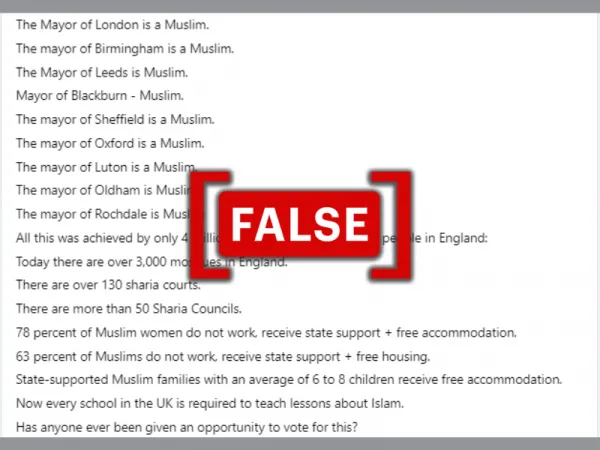By: Christian Haag
May 8 2024
False claims about Muslims in the U.K. spread after mayoral elections

Example of the claim shared online. (Source Facebook/Screenshot/Edited by Logically Facts)
The Verdict False
The posts include several false claims about Muslims in the U.K. that do not correlate with official statistics or policies
Context
A series of false claims about Muslims' political representation in the U.K. began circulating on social media following the mayoral elections on May 2. Claims were shared on Facebook and TikTok but had significant reach on X (formerly Twitter) after being shared by Laurence Fox, leader of the right-wing political party Reclaim.
In fact
Similar false claims about Muslims in the U.K. have previously circulated. A similar post was fact-checked by Full Fact back in 2017.
Mayors and U.K. elections
The posts make several inaccurate claims about mayors across the U.K. following last week's local and mayoral elections. During the votes, 10 metro mayors were directly elected to lead combined authorities, which usually govern large metropolitan areas and population centers.
The first claim, that the Mayor of London is Muslim, is correct. Sadiq Khan was elected for a historic third term in the recent vote. However, some of the other positions in the post do not exist. There is no mayor of Birmingham but there is a position of mayor of the West Midlands, to which Richard Parker was recently elected. Similarly, there is no mayor of Leeds but a mayor of West Yorkshire, to which Tracy Brabin was reelected. There is not a mayor of Sheffield but a mayor of South Yorkshire, to which Oliver Coppard was elected. These people are not Muslim.
Furthermore, the claim the election of any of these people was "achieved" by four million Muslims out of 66 million people in England is also false. The figure, 66 million, is the population of the U.K., not England, which has a population of 57 million people. In the latest 2021 census, 3.9 million people in England and Wales identified as Muslim.
Mosques, Sharia councils and "courts"
The post claims there are over 3,000 mosques in England. While there is no official register of the number of mosques in England, several reputable organizations have reported figures. The U.K. Centre for Research and Evidence on Security Threats found there were 1,825 mosques in all of the U.K. in 2018, while MuslimsinBritain.org, a directory of mosques and Muslim places of worship in the U.K., gives a similar figure of 1,858 mosques as of 2024.
Similarly, there are no official statistics on the number of Sharia councils or "courts" in the U.K. An independent review from 2018 into the application of Sharia law in England and Wales, commissioned by the Home Office, estimated there were between 30 and 85 sharia Councils across both states.
Sharia councils hold no legal status or binding authority under civil law in the U.K. but are commonly mislabeled as courts. According to research by Dr. Samia Bano, the primary role of Sharia councils is to offer family advice within Muslim communities in the U.K., particularly to help Muslim women obtain a divorce.
Muslims in work
The claims that 78 percent of Muslim women and 63 percent of all Muslims were out of work, receiving benefits and free housing are demonstrably false as they do not correlate with official government figures.
According to the official 2021 census of England and Wales, 37 percent of female and 60 percent of male Muslims were in employment. A further 12.4 percent of males and 13.2 percent of female Muslims were economically inactive because they were students.
With regards to housing, 46 percent of identifying Muslims own a house either outright or via a mortgage, according to the 2021 census. Furthermore, 27 percent of identifying Muslims lived in "social rented" housing, which has a subsidized rent but is not free.
Education about Islam in U.K. schools
Finally, the original post claims that every school in the U.K. is required to teach children about Islam. Religious education, or RE, is a compulsory subject in state schools, which most children attend but is not part of the national curriculum. The RE syllabus is decided by local councils and typically covers all major religions in the U.K., although academies and faith schools can set their own. While it is a compulsory subject, parents can withdraw their children from all or part of the lessons.
The verdict
Several false claims are made in these posts, including listing mayoral offices that do not exist, unverified figures on mosques and Sharia councils in the U.K., and misleading claims about religious education in U.K. schools. Due to the number of inaccurate statements, we have marked these claims as false.
Reference Links
London, meet the new boss, same as the old boss. Mayor Sadiq Khan wins historic third term - AP News
Read this fact-check in:


